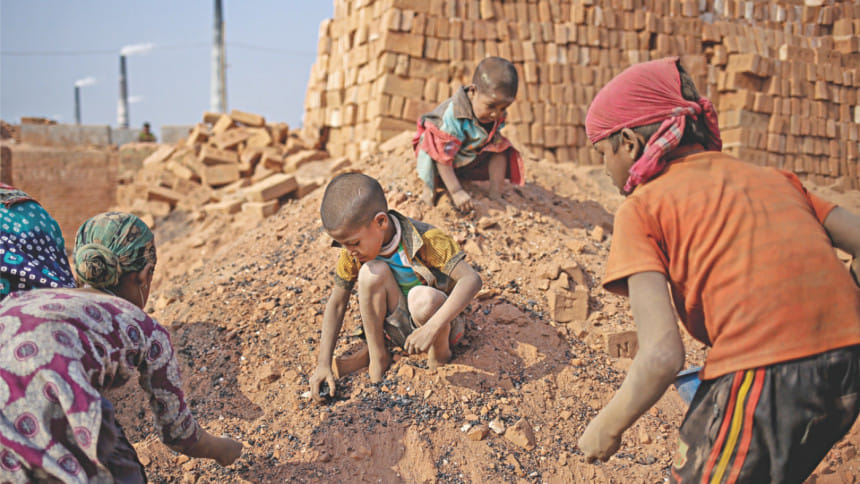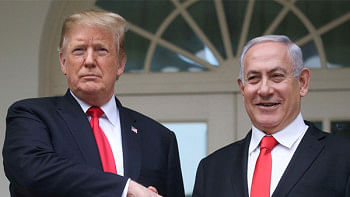Save Our Children

Photo: Mohammad Ponir Hossain
A five minute walk on the streets will roll out the situation for you on a red carpet- glaring at your face, wanting your full attention, terrifying you a little bit. Child labour is not only horrifyingly prevalent in our society, it is growing, and that is something we should be very, very afraid of. In that five minute walk, you will see children aged from 5/6 all the way to their teen years, carrying heavy equipment, sharp tools, fixing cars, and then some. Even the children who run from street to street, selling flowers and balloons are putting their lives at risk every day. When one of them dies, whether during the time they are handling the risks of their jobs, or whether they are murdered in broad daylight by their employer, who is it that we go to for answers?
"It is illegal for factories and other industries to hire children under 18, but even after implementing this law, we see very little improvement in the situation" says Syed Sultanuddin Ahmed, Assistant Executive Director, Bangladesh Institute of Labour Studies. According to a UNICEF report, in 2006, Bangladesh passed a Labour Law setting the minimum legal age for employment as 14. Nevertheless, it has been proven time and again that the enforcement of such labour laws is almost impossible in Bangladesh, because 93 percent of child labourers are employed in the informal sector such as small factories and workshops, on the street to sell relics or work for employers who force them to beg, in home-based businesses, and/or domestic employment.
Even though there is strong frequency of child labour in the country, there has been an increase in legislation that are against child labour. Bangladesh has ratified both the Minimum Age Convention of the International Labour Organization (ILO), and the ILO Worst Forms of Child Labour Convention. In addition, the country also ratified the UN Convention on the Rights of the Child.
"At the end of the day, the Government and the society are the ones who are responsible for the treatment of children in the country," says Syed Sultanuddin.
Despite all these measures taken, we can see very clearly that if not in one specific way, the children are being victims of terrifying incidents everyday. One remembers the death of Rakib Howlader, an employee in a repair shop on the streets of Tutparha Kabakhana, and how he was murdered by his employer and co-workers, who inserted a high-pressure air pump nozzle into his rectum and filled the body with air at a motorcycle repair shop. In a society where a child's life has so little respect from the adult-society, the prevalence of child labour makes the scenario even scarier for the children of our country.
According to a UNICEF report on Child Labour in Bangladesh, because of our social norms, and economic realities, child labour is widely accepted, and very common in Bangladesh. Many families rely on their children, no matter how old, to generate income for sustainability, so child labour is often of high value. In addition to that, employers, more often than not, prefer hiring children over qualified adults because they are cheaper and considered to be more compliant and obedient. "We have a body to inspect situations of child labour going to the extreme. It is for the Labour Inspection Department, and also the Social Welfare department to keep check on factories and other industries that are hiring children. There are children, whether above 14 or not, who are risking their lives everyday. These bodies must come forward and make regular visits to these factories and ensure safety to every employed child," says Syed Sultanuddin. "Additionally, the families sending their children to work at such a young age, and also the employers of these children should be held accountable. There are many schools in different upazilas for impoverished children to attend, but they also need skill development centres for future work, and also an alternate mean of income for the family. Charity and spreading awareness help very little, as we can see. Any family willing to send their child to work must speak to the concerned authorities, who will then ensure safety for the child," he says.
When children are forced to work, they are often denied their rights to education and/or play, which are vital for a child's growth- both physically and mentally. Along with that, many of the jobs that the children in Bangladesh perform are considered "hazardous", and put their physical and mental development at even greater risk. The UN Committee on the Rights of the Child expressed concern in 2009 that many Bangladeshi children continue to work in five of the worst forms of child labour-- welding, auto workshops, road transport, battery recharging and tobacco factories. Additionally, we have child labour forces in brick kilns, tannery factories and more. The Committee also raised concerns about the lack of mechanisms to enforce child labour laws or monitor working conditions, and insufficient public awareness about the negative effects of child labour, states the UNICEF report. Even though we have many rehabilitation centres for impoverished, orphaned, and/or working children, like the Shishu Unnayan Kendra, set up by the Department of Social Welfare, the rates of children as labours are ever-increasing, and the risk that they are implementing on their lives is also increasing.
With concern pouring in, The Star Weekend begins a series, where we will explore the different industries that are hiring children, what kind of risks they face, and the overall situation of the employers and employees, while we discuss with experts on how to make a Bangladesh that is safe for all its children.

 For all latest news, follow The Daily Star's Google News channel.
For all latest news, follow The Daily Star's Google News channel. 



Comments